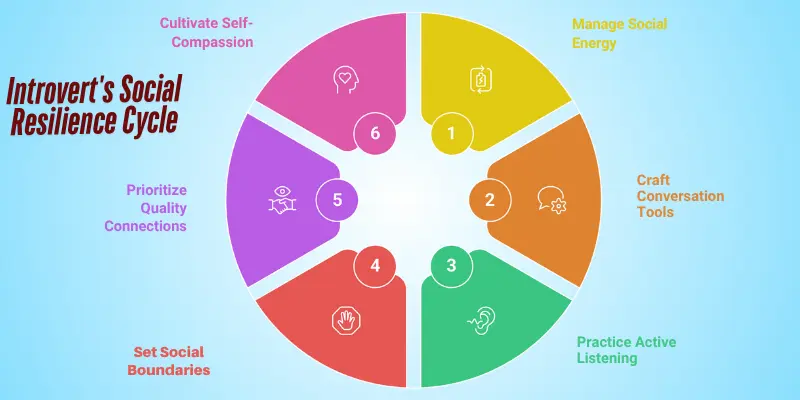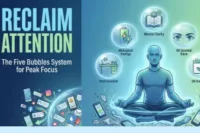Your Quiet Power: Mental Toughness Strategies for Introverts to Master Social Challenges
Published: 25/06/2025
If you’re an introvert, you know the feeling: walking into a crowded room, overwhelmed by noise, and yearning for a quiet corner to recharge. You crave deep connections, but the energy drain from socializing leaves you exhausted before you even begin.
Sound familiar? That unique fatigue from social events isn’t just about being tired — it’s an emotional and physical drain that’s hard to explain to extroverts.
But here’s the truth: mental toughness isn’t about being outgoing. Introverts have their own form of resilience — the ability to think deeply, reflect meaningfully, and connect on a deeper level.
The idea that mental toughness means being extroverted is simply wrong. Introverts face different challenges but also possess a quiet power — an inner strength to navigate social situations authentically and confidently.
In this guide, you’ll find specific strategies designed for introverts to help you manage energy, engage confidently, and set boundaries that protect your peace. These aren’t generic tips; they’re tailored solutions to help you thrive in social settings without feeling drained.
By the end, you’ll have the tools to master social challenges on your terms. Ready to discover your quiet power? Let’s get started!
The Introvert’s Social Operating System: It’s Different, Not Deficient
If you’re an introvert, you’ve probably felt that heavy weight after a long social event — the one that makes you want to retreat and recharge. It’s not just in your head. Social interactions genuinely cost energy for introverts, and here’s why:
Introverts tend to process the world more deeply. When you’re in a social setting, your brain isn’t just reacting to what’s happening around you; it’s analyzing, filtering, and reflecting on the conversations, the dynamics, the energy in the room. This internal focus requires a lot of mental and emotional energy.

While extroverts might get energized by socializing, introverts often feel drained. This isn’t a flaw or something to “fix” — it’s simply how you’re wired. You’re not broken because you need time alone to recharge; you’re designed differently. And that’s okay.
Key takeaway: Your energy needs aren’t a shortcoming; they’re just part of your introverted nature. Embrace it, don’t fight it.
Shifting Your Mindset: From “Surviving” to “Thriving” Socially
Here’s the thing: You don’t need to be more extroverted to thrive in social situations. The goal isn’t to become someone you’re not. Instead, it’s about engaging on your own terms, tapping into your unique strengths as an introvert, and owning your space in any social setting.
Think about it this way: Instead of just “surviving” a social event — focusing on getting through it without feeling exhausted — aim to thrive. That means preparing yourself to show up with confidence and authenticity, even if it feels like you’re stepping outside your comfort zone.
Your introversion can be a superpower. By understanding your energy and embracing who you are, you can navigate social settings with a sense of control and self-assurance. It’s not about pushing yourself to be someone else — it’s about making social interactions work for you.
When you shift your mindset from just getting through an event to fully participating in it on your own terms, you open the door to more meaningful and less draining experiences. You’ll feel empowered, not exhausted, after socializing. And isn’t that the kind of social life you want?
In summary: It’s not about changing who you are; it’s about thriving in your natural state. Social success doesn’t require pretending to be an extrovert — it requires embracing your introverted strengths.
Building Your Social Resilience: Essential Mental Toughness Strategies for Introverts
This is the part where we turn theory into action. The strategies listed below will help you build social resilience — a key part of your mental toughness toolkit. Let’s dive into the specifics:
1. The Art of Strategic Social Energy Management: Pre- & Post-Event Rituals
As an introvert, socializing can drain your energy, so it’s important to manage your energy both before and after social events. Think of it like charging your phone — if you don’t plug it in, it won’t have enough power to function.

The “Pre-Charge” Power-Up: Designate non-negotiable alone time before social commitments
Before heading into a social situation, take some time to recharge. Whether it’s 20 minutes of quiet reading, a brisk walk, or a few minutes of deep breathing, the key is to make it a priority. Set this time as a boundary — no work, no checking your phone — just you recharging.
The “Recharge” Recovery Protocol: Plan restorative activities (reading, quiet reflection, nature) immediately after
Socializing can be tiring, so give yourself permission to recover afterward. Don’t immediately jump back into work or more obligations. Instead, make it a habit to engage in a calming activity right after a social event. Whether it’s reading a book, journaling, or simply sitting quietly in nature, give yourself space to re-energize.
Outperform Focus: This goes beyond just “rest.” It’s about intentionally planning your energy management, so you’re at your best when socializing and have the tools to recover afterward.
2. Crafting Your “Social Toolkit” for Confident Conversations
One of the toughest parts of socializing can be navigating conversations. Fortunately, with the right strategies, you can tackle this with confidence.
Your Go-To Conversation Starters: Develop 3-5 open-ended questions tailored to common social settings
Having a few go-to questions can take the pressure off when you’re trying to initiate a conversation. These should be open-ended and easy to use, such as “What’s been the highlight of your week?” or “What’s something interesting you’ve learned lately?” Having these questions ready will allow you to shift your focus from worrying about what to say to just engaging in the moment.
Graceful Exit Lines (and Entry Points): Practice polite phrases to join/leave conversations smoothly
You don’t have to stay stuck in awkward conversations or feel trapped. Have some exit lines prepared, like “It was really great chatting with you; I’m going to grab a drink now.” When entering conversations, try phrases like “Mind if I join in?” or “I’d love to hear more about what you’re discussing.” These simple tools will help you navigate social settings with ease.
Outperform Focus: This is more than just basic conversation tips. We’re giving you specific tools that will reduce the stress of social interactions, letting you feel more confident and in control.
3. Master the Quiet Power of Active, Empathetic Listening
As an introvert, one of your greatest strengths is your ability to listen. Use it as your secret weapon in social situations.
Listen to Understand, Not Just to Reply: Focus on genuine absorption, not formulating your next sentence
When you’re listening, don’t just wait for your turn to speak. Truly engage with the other person’s words, emotions, and ideas. This not only helps you connect better but also takes the pressure off you to constantly talk. Listening deeply allows you to make conversations feel more meaningful.
Ask Thoughtful Follow-Up Questions: This builds deeper rapport and reduces your speaking burden
One of the easiest ways to keep a conversation flowing without feeling pressured to do all the talking is by asking follow-up questions. Questions like “That sounds really interesting, can you tell me more?” or “How did that make you feel?” will not only deepen your connection but also keep the focus on the other person.
Outperform Focus: You’re not just listening passively — you’re turning it into a powerful social skill. Active listening will make you more present in conversations and build stronger, more authentic connections.
4. Erecting Your Unbreakable Social Boundaries
One of the most important skills you can develop as an introvert is setting strong boundaries. This will help preserve your energy and protect your mental well-being.
The Power of “No” (and “Not Right Now”): Learn to decline invitations or shorten visits without guilt
It’s okay to say no. In fact, it’s necessary for your well-being. Whether it’s declining a last-minute invitation or politely shortening your time at a social event, practicing the power of “No” is an essential part of maintaining your energy levels and staying mentally tough.
Recognize Your Social “Limit Signals”: Pay attention to internal cues of energy depletion
Your body will give you signs when you’ve hit your social limit — you might feel more tired, distracted, or anxious. Learning to recognize these signals will help you make better decisions about when to step back and take care of yourself.
Outperform Focus: Setting boundaries isn’t about avoiding social situations, it’s about engaging in them on your terms. By doing so, you preserve your mental resilience and authenticity.
5. The “Deep Dive” Approach: Prioritizing Quality Over Quantity
You don’t have to be everywhere or talk to everyone at a social event. Instead, focus on making deeper connections with fewer people.
Seek Out One-on-One Pockets: Gravitate towards quieter areas for more meaningful interactions
At parties or gatherings, look for quieter spots where you can have one-on-one or small group conversations. This allows for more meaningful exchanges, rather than feeling overwhelmed by large, noisy groups.
Invest in Meaningful Connections: Focus energy on a few quality conversations rather than broad, shallow mingling
It’s not about talking to everyone in the room. It’s about finding a few people with whom you can build a deeper connection. By focusing on quality over quantity, you’ll feel more fulfilled after social events.
Outperform Focus: This approach aligns perfectly with introverted preferences, allowing you to engage socially while staying true to your need for depth and authenticity.
6. Cultivating Radical Self-Compassion: Your Inner Social Coach
Building social resilience isn’t just about external strategies. It’s also about strengthening your inner voice to support you through challenges.
Release the Replay Button: Don’t endlessly re-analyze perceived “awkward” moments
If you’ve ever replayed a social interaction in your mind, focusing on every awkward pause or misstep, you’re not alone. But remember, most people aren’t analyzing you the way you are. Let go of these thoughts and move forward with kindness toward yourself.
Celebrate Your Micro-Victories: Acknowledge every effort, no matter how small, in social settings
Did you step into a conversation you were nervous about? Did you manage to stay at a social event for an hour without feeling completely drained? Celebrate those victories! Every step forward is progress, and giving yourself credit helps build your emotional resilience.
Outperform Focus: Social resilience is built on self-compassion. By being kind to yourself and acknowledging your growth, you’ll reinforce your mental toughness over time.
These strategies are not just about surviving social interactions; they’re about mastering them on your own terms. Each approach taps into your natural strengths as an introvert, making social situations more manageable, less exhausting, and more rewarding.
Your True Advantage: How Introvert Traits Fuel Social Mental Toughness
Introversion often gets a bad rap, but what if we flipped the script? Instead of seeing introversion as a challenge to overcome, let’s recognize it as a superpower that can help you navigate the world with grace and authenticity. Your introverted traits aren’t weaknesses — they’re the key to unlocking your social mental toughness. Let’s explore how these unique qualities fuel your success in social situations.
Thoughtfulness & Deliberation: Leads to More Impactful, Less Impulsive Contributions
One of the most powerful traits introverts bring to the table is thoughtfulness. Unlike quick thinkers who might blurt out ideas without much reflection, you take your time to carefully consider your words. This deliberate nature allows you to make more impactful, meaningful contributions, whether in a meeting, a group discussion, or a casual conversation.
Why it’s powerful: Your ability to think before you speak means that when you do say something, it carries weight. You’re not just filling space — you’re sharing something considered and valuable, which makes people pay attention.
Real-world example: Think about a meeting where everyone is throwing out ideas quickly. You, taking the time to think, may come up with the most strategic and well-considered suggestion, standing out from the crowd.
Observational Acuity: Your Natural Ability to Read the Room and Understand Dynamics
As an introvert, you tend to be highly observant. While others might be caught up in the noise of a social event or meeting, you’re quietly analyzing the environment, noticing the body language, the unspoken dynamics, and the little details that others overlook. This gives you a unique edge in understanding people and situations.
Why it’s powerful: Being able to read the room allows you to make more informed decisions about when to engage, what to say, and how to navigate complex social interactions. You understand the unspoken cues, and that makes you a master at anticipating how others are feeling or what they need.
Real-world example: At a social gathering, you might notice someone standing alone, feeling left out. Because of your ability to pick up on these cues, you’re the one who naturally reaches out, making that person feel seen and valued.
Authenticity & Depth: Your Preference for Genuine Connection Builds Stronger, More Trusting Bonds
Introverts tend to value quality over quantity, especially when it comes to relationships. You’re not interested in surface-level connections. Instead, you seek out deeper, more meaningful interactions. This preference for authenticity makes your relationships more fulfilling and long-lasting.
Why it’s powerful: In a world full of superficial exchanges, your ability to form genuine, heartfelt connections is rare. People appreciate your authenticity, and this makes them trust you more. When you engage, it’s not just about talking — it’s about truly understanding and connecting.
Real-world example: While others may have a list of acquaintances, you have a few close friends who know the real you, and that bond is something that can’t be replicated with small talk or surface-level relationships.
Inner Resourcefulness: Less Reliant on External Validation, Drawing Strength from Within
Introverts often find their strength from within. While extroverts may seek external validation or energy from others, introverts draw on their inner reserves to navigate the world. This inner resourcefulness makes you resilient, capable of handling social challenges without needing constant affirmation from others.
Why it’s powerful: Your ability to rely on yourself rather than external sources of validation builds mental toughness. You don’t need to constantly check in with others or seek approval — you trust your own instincts and abilities. This self-sufficiency allows you to maintain your composure in challenging social situations.
Real-world example: In a work setting, while others might seek constant feedback or reassurance, you confidently trust your judgment, making decisions based on your experience and instincts, which gives you a sense of inner strength that others may envy.
Outperform Focus: These traits — thoughtfulness, observational acuity, authenticity, and inner resourcefulness — aren’t just quirks of introversion. They are powerful strengths that introverts can leverage to navigate social situations with confidence and grace. By embracing these natural abilities, you’ll not only become more resilient but also more successful in building genuine, meaningful connections with others. So, next time you feel like you’re at a disadvantage in a social setting, remember: your introverted traits are the key to unlocking your true social power.
Beyond the Event: Sustaining Your Social Resilience Long-Term
Building social resilience doesn’t happen overnight — it’s a continuous journey of growth, self-discovery, and refinement. The strategies we’ve discussed so far are just the beginning. To maintain and strengthen your social resilience over time, you need to focus on ongoing development and habit formation. Here’s how to keep the momentum going:
Practice Progress, Not Perfection
The road to social mastery isn’t about perfection; it’s about progress. It’s easy to feel discouraged if things don’t go exactly as planned during social events, but remember: each small step forward counts. Every time you step into a social situation, you’re building confidence, refining your skills, and learning more about yourself.
Why it’s important: Social resilience, like any other skill, is developed through consistent, small efforts. You don’t need to overhaul your entire social life in one go. Instead, celebrate the small wins — whether it’s having a meaningful conversation with someone, staying at a social event a little longer than usual, or just stepping outside your comfort zone.
Actionable Tip: Set achievable social goals. For instance, aim to engage in at least one conversation at every event, or gradually increase the time you spend in social situations. By focusing on progress instead of perfection, you’ll continue to grow without feeling overwhelmed.
The Post-Mortem Power-Up (Not Punishment)
One of the most common traps introverts fall into is overanalyzing social events afterward, replaying every moment in their heads and picking apart what went wrong. This is known as the “social replay button,” and it can be exhausting and counterproductive. Instead, shift your mindset to a post-event reflection that’s more about learning and growth than self-criticism.
Why it’s important: The goal of reflection is to improve for next time, not to beat yourself up. Acknowledge the moments that went well and identify areas where you could do better, but do so with kindness and a growth-oriented mindset. This will allow you to build resilience without the emotional toll of self-criticism.
Actionable Tip: After social events, give yourself 10-15 minutes to jot down your reflections in a journal. What went well? What felt challenging? What can you try next time? This brief, objective reflection will help you make steady improvements without being too hard on yourself.
Mindful Zone Expansion: Gradually Pushing Comfort Zones
Growth happens outside your comfort zone, but that doesn’t mean you need to jump into the deep end right away. Instead of overwhelming yourself with drastic changes, focus on gradually expanding your social comfort zone. By taking small steps, you’ll increase your social resilience without feeling burnt out or discouraged.
Why it’s important: Big leaps can feel too intimidating and often lead to burnout. However, small, manageable steps allow you to stretch your limits gradually, which builds your confidence and makes social interactions feel more manageable over time.
Actionable Tip: Identify one area where you can challenge yourself just a little bit more. Maybe it’s staying at a party for 15 more minutes than usual, or striking up a conversation with someone you wouldn’t normally talk to. These small changes, over time, will help you gradually expand your comfort zone, making future social events feel easier and more natural.
Outperform Focus: Social resilience is a long-term commitment. By focusing on progress, using reflection as a learning tool, and expanding your comfort zone gradually, you’ll build social toughness that doesn’t just help you survive social events, but thrive in them. These small, consistent actions will lead to lasting growth and continued success in your social interactions.
Conclusion: Master Your Social World, On Your Own Terms
As we wrap up, remember this: introverts have incredible potential for mental toughness and social mastery. Your introverted traits — thoughtfulness, depth, and inner strength — are not barriers; they are the very tools that can help you thrive in social situations. Embrace these qualities, and you’ll discover a level of social resilience and confidence that feels authentic to who you are.
Whether you’re managing your social energy with pre-event rituals or practicing active listening to deepen connections, the key takeaway here is that you can thrive authentically. You don’t need to change who you are to succeed socially; it’s about aligning your natural strengths with practical strategies that empower you to handle social challenges with ease.
Key Takeaways:
- Strategic Social Energy Management: Prioritize your well-being with pre- and post-event rituals to optimize your energy.
- Crafting Your Social Toolkit: Equip yourself with conversation starters and graceful exit lines to ease social anxieties.
- Active Listening: Turn your ability to listen into a powerful, engaging skill that strengthens relationships.
- Setting Boundaries: Protect your mental and emotional energy by establishing clear, healthy boundaries.
- Quality Over Quantity: Focus on building deeper, meaningful connections rather than trying to engage with everyone.
- Self-Compassion: Be kind to yourself and celebrate small victories in your social journey.
Now that you have the tools to succeed in social situations, it’s time to start applying them. Remember, this is a journey — small, consistent steps will lead to big changes over time. Empower yourself to engage with the world on your own terms, and watch how your confidence and social resilience grow.
Ready to dive deeper into mastering your mental toughness? Start applying these strategies today, one step at a time, and transform your social experiences for the better.
While these specialized strategies empower your social interactions, true mental fortitude is a universal skill. To unlock the foundational principles of unshakable mental toughness that will serve you in all of life’s toughest challenges — beyond just social settings — explore our ultimate guide: [How to Build Unshakable Mental Toughness: The Ultimate Guide for Life’s Toughest Challenges]
By mastering your social world on your terms, you’ll not only become socially resilient but build the mental strength to face any challenge life throws your way.
Your Top Questions About Introvert Social Mastery, Answered.
Absolutely not. For introverts, mental toughness isn’t about being loud or extroverted. It’s about building inner resilience to navigate social situations authentically, manage your energy effectively, and thrive on your own terms without compromising your true self.
Yes, it’s completely normal and a common experience for introverts. Your brain is wired to process information more deeply, which means social interactions can be energy-intensive. Our guide provides strategies for Proactive Energy Management to help you recharge effectively.
Mastering small talk involves preparation, not personality change. Our “Social Toolkit” strategy in Section III suggests having go-to conversation starters and graceful exit lines. Focusing on Active Listening also shifts the pressure from speaking to engaging.
No, the goal is never to change who you fundamentally are. Instead, these strategies help you leverage your inherent introvert strengths to build confidence and resilience in social settings, allowing you to engage authentically without feeling forced or overwhelmed. It’s about mastery on your own terms, as discussed throughout the post.
Overstimulation is a real challenge for many introverts. Our guide emphasizes Setting Unbreakable Social Boundaries, which includes knowing when to take a break, step away, or even politely excuse yourself from a situation. Recognizing your limits is a key aspect of mental toughness.
Absolutely. Introverts often prioritize quality over quantity in relationships. Our “Deep Dive” approach focuses on seeking meaningful, one-on-one connections that are far more fulfilling and less draining than widespread mingling. Your ability to listen deeply often fosters stronger bonds.
The mental toughness strategies discussed here, like self-compassion, boundary setting, and energy management, are foundational principles that apply to all areas of life. To explore these broader concepts and build unshakable mental toughness for any challenge, we highly recommend our ultimate guide: [How to Build Unshakable Mental Toughness: The Ultimate Guide for Life’s Toughest Challenges]
It’s a common experience for introverts to feel unheard or misinterpreted in dynamic group settings. Mental toughness here involves self-acceptance and strategic engagement. Focus on Quality Over Quantity conversations, seeking out genuine exchanges. Remember, your Thoughtfulness and Observational Acuity (as discussed in Section IV) are strengths that allow you to contribute meaningfully, even if less frequently.
This is a classic introvert experience! Your brain is wired to process deeply, not always quickly under pressure. Our “Social Toolkit” strategy in Section III is key here. Having Prepared Conversation Starters can give you a mental anchor. Also, practice Active Listening – focusing on the other person can take the pressure off yourself and help ideas flow more naturally.

- Be Respectful
- Stay Relevant
- Stay Positive
- True Feedback
- Encourage Discussion
- Avoid Spamming
- No Fake News
- Don't Copy-Paste
- No Personal Attacks

- Be Respectful
- Stay Relevant
- Stay Positive
- True Feedback
- Encourage Discussion
- Avoid Spamming
- No Fake News
- Don't Copy-Paste
- No Personal Attacks





